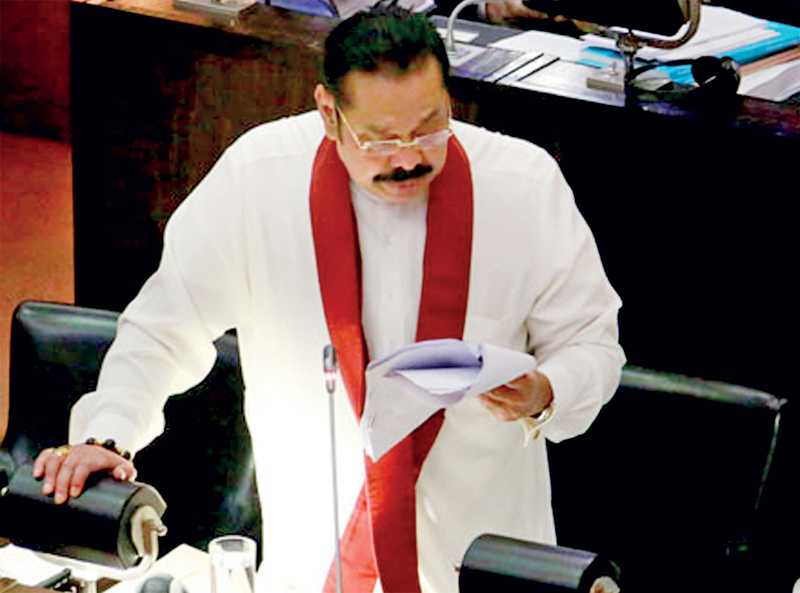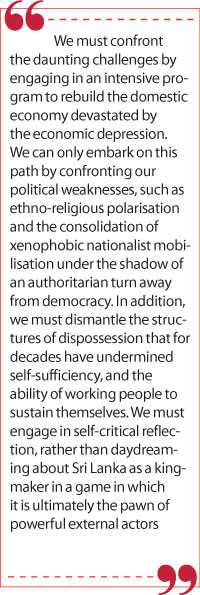Wednesday Feb 18, 2026
Wednesday Feb 18, 2026
Thursday, 3 December 2020 00:00 - - {{hitsCtrl.values.hits}}

In the inaugural Budget speech, the Prime Minister proudly claimed: “We are at a time, when many countries have realised the geopolitical significance of our country.” Indeed, many political analysts have similarly pontificated about Sri Lanka’s ability to derive benefits from its supposedly increasing geopolitical significance. We strongly disagree though with the broadly celebratory assumption that these analysts share. Instead, we only see dangers for Sri Lanka in the context of heightened geopolitical tensions
By the Collective for Economic Democracy
Annual budgets announce the Government’s priorities for the domestic economy. But we cannot address the historic challenges facing Sri Lanka without considering the global context.
In our last article on the domestic implications of Budget 2021, we argued that it lacks meaningful proposals to rebuild an economy falling into depression and a society ravaged by the COVID-19 pandemic. These intersecting crises are affecting countries all over the world. But resolving them depends on our ability to recognise the specific implications for Sri Lanka.
Given the country’s historical challenges overcoming its political economic dependency, what is the Government’s strategy to address the external sector; particularly the balance of payment problems and growing geopolitical pressures?
In the inaugural Budget speech, the Prime Minister proudly claimed: “We are at a time, when many countries have realised the geopolitical significance of our country.”
Indeed, many political analysts have similarly pontificated about Sri Lanka’s ability to derive benefits from its supposedly increasing geopolitical significance. Different factions, ideologies, and interest groups promote ways of navigating the competing interests of China, India, the US, Japan, and the EU. We strongly disagree though with the broadly celebratory assumption that these analysts share. Instead, we only see dangers for Sri Lanka in the context of heightened geopolitical tensions.
The lesson from our own past is obvious. Our inability to address the national question allowed for external actors to exacerbate the ethnic conflict, which then descended into a protracted civil war. Similarly, our current inability to address our economic problems has made us more vulnerable to the whims of external actors.
This situation has been exacerbated by the long neglect of domestic production after the neoliberal turn in 1977, when we turned our back on the critical question of self-sufficiency. We are now condemned to go with the begging bowl to powerful actors, who will extract from Sri Lanka, and especially its working people, according to their strategic interests.
The responsibility for the fractures which external actors now seek to exploit – from the polarisation of our diverse society, to tremendous economic inequalities – rests squarely upon those who have wielded state power. They have promoted the class interests of the elite to the detriment of the working people. This process in turn has led us onto the unsustainable path we are currently on. Therefore, understanding Sri Lanka’s position in a precarious geopolitical and global economic situation requires a deeper class analysis.
A sober and much more realistic inquiry contrasts with fantastical speculation about the gains Sri Lanka can enjoy by supposedly playing off one external power against another. Marx and Engels made the point clear in the Communist Manifesto: “Though not in substance, yet in form, the struggle of the proletariat with the bourgeoisie is at first a national struggle. The proletariat of each country must, of course, first settle matters with its own bourgeoisie.”
In our own moment, to solve global problems, we must first challenge those in and out of political power who claim to champion Sri Lankans, while pushing elite interests. The latter’s interests are reflected in geopolitical manoeuvring vis-à-vis external actors.
Dependency and external pressures
For a long time, Sri Lanka has had a dependent economy. Colonialism ravaged Sri Lanka for centuries, and neocolonial extraction undermined the promise of postcolonial liberation. Despite the challenges arising from this situation, the Government has not backed up its rhetoric about import substitution. The lack of foreign earnings to pay for imports provoked the initial shift. But the Government has avoided allocating the necessary resources in the Budget to increase local production.
Meanwhile, the Opposition claims an IMF agreement would strengthen “investor confidence.” The Opposition’s naiveté regarding the interests of global investors, who are running to safe assets, parallels the government’s extravagant claims that it can leverage the interests of powerful external actors.
The actual circumstances could not be clearer. Sri Lanka’s debt is under attack by rating agencies, whose complicity with global finance capital is no secret. As a result, it has been reduced to junk bond status. Under growing desperation, many may see an IMF agreement, which would be contingent on stringent measures such as austerity and privatisation, as a way out of the tremendous premium on interest rates that would likely be imposed on Sri Lanka if it attempts to borrow again in the global financial markets. But it is a tremendous leap of faith to assume that such an agreement will alleviate Sri Lanka’s foreign debt problems; in addition, of course, to the massive social damage it would create.
In this context, we must also call out bilateral actors for their self-serving rhetoric. The EU, for example, has resumed its tutelage about the virtues of the global market. It has condemned Sri Lanka’s moves to restrict imports. The EU, however, has no right to preach here, given its own legacy of colonial and neo-colonial extraction. Even its supposedly “pro-poor” programs like GSP+ simply incorporated Sri Lanka into low-wage supply chains. This did little to upgrade the country’s access within higher value-added industries.
Similarly, in view of its Secretary of State’s visit, the US, having long pursued disastrous interventions curtailing socialist and even modest social democratic experiments in Third World countries, is also in no moral position to dictate Sri Lanka’s external strategy. This includes the US’s attempts to chasten the Government in its relationship with China. Sri Lanka must decide for itself on the way forward for its own external relations, whether it be with India, China or other emerging powers, from the vantage point of building an egalitarian society.
At the same time, we must remain vigilant of the dangers of Sinhala Buddhist nationalism’s attempt to appropriate vaguely left-sounding demands about sovereignty. Sinhala Buddhist nationalism identifies the problem as one rooted in a cultural conception of the “West,” rather than the political economic relationships that reflect our own domestic class structure. The reality is that the global hegemonic order will not necessarily become more egalitarian simply because the US is experiencing crisis. As progressives, we must push ourselves toward clear analysis of the ways in which the ruling class, through its right-wing nationalist ideologues, continues to maintain power by cultivating divisions among the oppressed within and between countries.
In the meantime, the Government is unwilling to begin the long process of overhauling the domestic economy by pursuing redistributive measures. Instead, it draws from the hope of redemption by external actors, such as China. Ironically, despite its loud championing of national sovereignty, it erases the collective agency of Sri Lankans, who, we must constantly re-emphasise, ultimately control their own destiny. We must look for solutions within, not outwards.
In contrast, following the Government’s path is a recipe for disaster. It is ideologically blind to the fact that China, for example, is embroiled in its own national political and economic contradictions, including growing inequalities. Accordingly, will we simply substitute the US for China, while remaining trapped within the global financial capitalist order? Will we seek out more neoliberal projects for global finance such as the Port City and the sale of strategic assets, which will further erode the autonomy of our economy?
No quick fixes
The Government is caught in a bind, given that its own nationalist base may rhetorically oppose such deals. As a result, it appears to be working through nationalist ideologues to convince its supporters that China’s support is critical to strengthening the Sinhala Buddhist nationalist project in Sri Lanka. This strategy will likely compound existing ethnic and religious divides, even as we find it increasingly difficult to contain the political economic fallout of depression. In our last article, we argued that the first step to rebuilding the domestic economy requires investing in rural areas and engaging in redistributive measures, such as wealth and property taxes.
On the other hand, what is the alternative to the crisis in the external sector? Simply put, we must prioritise self-sufficiency in our global engagement. On a superficial level, the Government has recognised the external trap it is in. This is evident from its willingness to break with decades-old neoliberal ideology and impose import restrictions. It has even pointed in the direction of import substitution. But its lack of viable plans for public investment combined with its appeals to an external saviour exposes the emptiness of its economic program vis-à-vis the much deeper reconstruction necessary to overcome the depression.
We can develop an alternative perspective by engaging critically with our own past. Historically, Sri Lanka was an active participant in the Non-Aligned Movement formed in the mid-1950s during the period of decolonisation and the Cold War. It subsequently became a proponent of the New International Economic Order during the global economic downturn in the 1970s. We may aspire to similar solutions now, including initiatives to restructure global debt. But those interventions emerged after decades of patient anticolonial work forging solidarity between colonised peoples and Third World countries. It included input from important economists and intellectuals who posed important questions, such as Samir Amin, who asked whether “de-linking” can be achieved, and if so, how.
Of course, in the long run, the egalitarian solutions that Sri Lanka could propose in conjunction with other countries would require working together to strengthen the collective bargaining capacity of those countries that have long been at the receiving end of the unequal global order. Indeed, if we examine the free trade regime under neoliberal globalisation over the last few decades, both Western countries and China have gained much from it, while most of the Third World economies have been the losers. But even as we critique this system, we must start by getting our house in order. There is no easy salvation from abroad, either in becoming a willing appendage of China or by getting embroiled in more loans from Western investors that are backed by the IMF.
We must confront the daunting challenges by engaging in an intensive program to rebuild the domestic economy devastated by the economic depression. We can only embark on this path by confronting our political weaknesses, such as ethno-religious polarisation and the consolidation of xenophobic nationalist mobilisation under the shadow of an authoritarian turn away from democracy. In addition, we must dismantle the structures of dispossession that for decades have undermined self-sufficiency, and the ability of working people to sustain themselves.
We must engage in self-critical reflection, rather than daydreaming about Sri Lanka as a kingmaker in a game in which it is ultimately the pawn of powerful external actors. We must first embark on the difficult task of building economic democracy, with an eye toward rebuilding solidarity in the global periphery. Otherwise we will continue to be at the receiving end from one great power or the other, regardless of the grandiose promises made in Budget 2021.
(The Collective for Economic Democracy consists of academics, researchers and activists involved in analysing the political economy of Sri Lanka with a social justice perspective.)